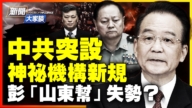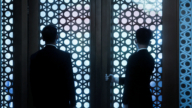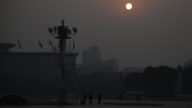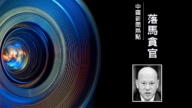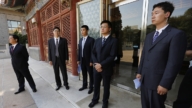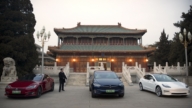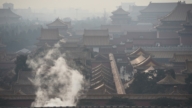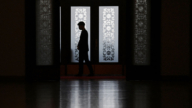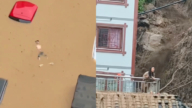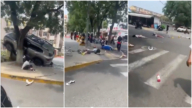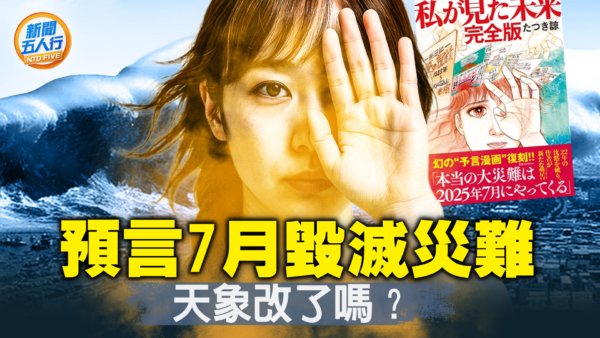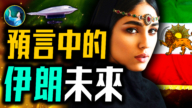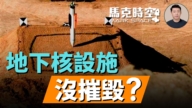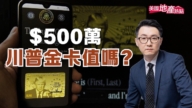【新唐人2012年6月23日讯】赵紫阳在软禁中的晚年,对中国问题以及中共执政的合法性进行了反思,他站到全民族、全中国的角度去认识问题。他认为,现代化国家必须实行议会民主政治,赵紫阳认定胡锦涛、温家宝这两位中共领导人,很难在中国的改革中成就大事业。学者认为,做到中共最高层,如果没有魄力打破专制的局面,那么就会不可避免的接着做坏事,面临的是未来的清算。
赵紫阳在1980年到1989年期间曾经先后担任总理和中共总书记。1989年赵紫阳由于反对武力镇压中国天安门民主运动而被罢黜,之后一直被软禁到2005年去世为止。
原中共“中央农村政策研究室”研究员姚监复,曾经在2004年先后两次探访赵紫阳,了解了赵紫阳晚年的思想。
姚监复表示,生命后期的赵紫阳经过反思后,已经跳出中共原来的“四个坚持”,站到全民族、全中国的角度思考如何解决中国问题。他明确指出:中国必须实行议会民主政治。
对于胡锦涛、温家宝这两位中国领导人,赵紫阳认定他们俩是好人,但不可能大有作为。赵紫阳为什么这么说呢﹖姚监复问过赵紫阳这个问题,而赵紫阳回答说,因为“他是我们培养的人。”
原中共“中央农村政策研究室”研究员姚监复:“你必须要认识到这一点才能改,否则你不敢抛弃一党专政这个思想就难以真正改革。到现在为止,我觉得他们没有达到赵紫阳去世以前的思想高度,也没有兑现1940年,40年代毛泽东向全国承诺的诺言。”
这里所说的毛泽东承诺的诺言就是:“政治改革必须废除一个党、一个主义、一个领袖、一个党军的法西斯独裁政治制度。”
姚监复指出,中共领导人是这个制度培养的,所以这个专制制度决定了他们必须抱着“炸弹”击鼓传花,只要不在我这一届垮了就完了。这其中有认识上的原因,也有魄力的原因,姚监复说:“他们是悲剧制度下悲剧性的人物”。
不过,《北京之春》杂志主编胡平认为,担任中共最高层,如果没有魄力打破这个局面、去做大好事的话,那么就会不可避免的接着做坏事。
胡平:“ 他们一旦登上那个位置,那就是必然造成这种不做好事就要做坏事。胡锦涛10年来,我们看看他做了很多坏事,他对六四没有平反,对法轮功也没有平反。其实这两件事他都不是直接责任,他要是做并不是完全不可能,但是他没有这么做,结果到头来他就不得不在所谓维稳的这个道路上越走越远。”
不过,“山东大学”退休教授孙文广认为,目前看来,胡温错失了利用“薄熙来事件”推进改革和否定江泽民的那套路线的最佳时机。但是,在他们主政的10年中,政法委书记周永康做了很多违法的事情,多次重大镇压民众的和平示威和宗教信仰民众,致死很多人。胡温做为最高领导,需要对这些事情表态。
孙文广:“ 将来人们是要在历史的审判当中会审判一些人,比如江泽民是一定要审判他,邓小平就六四事件也要审判他。那么,胡锦涛在这10年里面你对大事情不改正,而且继续镇压,那也是一种要追究罪责的问题啦。”
但是,胡平指出,胡温想做事“也很难”。因为整个中共统治集团成了一个“黑帮”、成了一个“黑社会”,你要是在里边改革,首先面临的就是这个黑帮强烈的反对。所以中国的政治改革需要依靠社会、民间的力量。
赵紫阳在《改革历程》一书中讲到,中国最终要过渡到议会民主政治,首先是开放党禁、报禁,更重要的是司法独立,还有军队的国家化。
采访/秦雪 编辑/宋风 后制/周天
Zhao’s Last Years: Hu-Wen Incompetent To Do Great Things
In his last years under house arrest, Zhao Ziyang
reflected on China’s problems.
He also looked at the ruling legitimacy
of the Chinese Communist Party (CCP).
He viewed these issues from a perspective
of all people and the whole country.
Zhao believed that a modern state must
implement parliamentary democracy.
He identified that Hu Jintao and Wen Jiabao,
are hard to do great things in China’s reform.
Scholars think that, when reaching the top CCP echelons,
if they have courage to break the authoritarian situation,
they will inevitably continue to do bad things.
They will face liquidation in future.
From 1980 to 1989, Zhao served as prime minister
and CCP General Secretary.
In 1989, Zhao was ousted after opposing the use
of military force to suppress the Tiananmen Square democracy movement.
He remained under house arrest until his death in 2005.
Yao Jianfu, former researcher of the CCP Central Rural
Policy Research Office visited Zhao twice in 2004.
He understood Zhao’s thinking in his later years.
Yao said that Zhao had stepped out of CCP’s “four cardinal
principles”, during his reflections in the last years of his life.
He thought about how to deal with China’s problems from
the point of the whole people and the whole country.
He clearly pointed out that China must
implement parliamentary democracy.
As Hu Jintao and Wen Jiabao, the two Chinese leaders,
Zhao identified that they two are good persons.
However, it’s impossible for them to accomplish great things.
Why did Zhao say this? Yao asked Zhao this question.
Zhao answered, “they are the persons we brought up.”
Yao Jianfu: “You must realize this
before you are able to change.
Otherwise you dare not abandon the idea of one-party
dictatorship. It would be difficult to conduct real reform.
So far, I think they have not reached the height
of Zhao’s thought prior to his death.
Neither have they fulfilled Mao Zedong’s
commitment to the nation in 1940.”
Mao’s commitment was that “Conducting political reform
must abolish the fascist dictatorship political system
of one party, one doctrine, one leader and one party-military.”
Yao pointed out that CCP leaders
are cultivated by the CCP system.
Therefore, this authoritarian system determines that they
must embrace a “bomb” to pass to the next.
‘As long as it doesn’t collapse in my term, it’s OK.’
It includes factors of understanding and courage as well.
Yao said: “They are tragic persons in the tragic system.”
However, Hu Ping, editor of “Beijing Spring" magazine,
said that, as top CCP leaders,
if they have no courage to break the situation to do
very good things, they will inevitably do bad things.
Hu Ping: “Once they reach that position, they are bound
to do either good things or bad things.
Over the past 10 years, we have seen Hu
has done a lot of bad things.
He has not conducted vindication of the Tiananmen
Square incident, nor of Falun Gong.
In fact, with these two things, he is not directly responsible,
so it is not completely impossible if he wants to.
But he doesn’t. Consequently, he has to go further and
further on the path of so-called maintenance of stability.”
However, Sun Wenguang, a retired professor
at Shandong University commented.
So far, Hu and Wen have missed the best time to make use
of the Bo Xilai incident to carry out reform, denying the route of Jiang Zemin.
In their rule of 10 years, Zhou Yongkang, secretary
of the CCP Politics and Law committee, did a lot of illegal things,
heavily suppressing peaceful public demonstrations,
and religious believers several times, with many deaths.
As the top leaders, Hu and Wen need
to show their attitude to these things.
Sun Wenguang: “In the future, the people will judge
some persons in the judgment of history.
This includes Jiang Zemin, and he is sure to be sentenced;
Deng Xiaoping will also be sentenced because of the Tiananmen Square Incident.
If Hu has not corrected the big things during the past
10 years, and continue to suppress people, it is also an issue that will be investigated.”
Hu Ping pointed out that it is very difficult even
if Hu and Wen want to do some things.
This is because the entire CCP ruling system
has formed a “gang” and a “triad”.
If you want to reform within it, the first thing you will face
is the strong opposition from this gang.
So China’s political reform needs to rely on
the strength of the society, the people.
Zhao mentioned in the book “The Reform Process”
that China will eventually transfer to democracy.
The first step is to lift the party
restriction on newspapers.
More importantly, it requires an independent judiciary
and the nationalization of the army.


